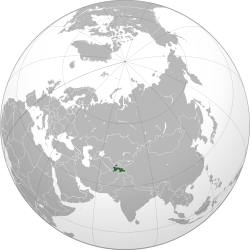Tajikistan: IRP Leader Examines Moderate Islam’s Influence In Central Asia – Analysis
Tajikistan has experienced bouts of internal violence in the past couple of years, but the bloody episodes in the Rasht Valley and in Gorno-Badakhshan have little to do with home-grown Islamic extremism, asserts Muhiddin Kabiri, the leader of the Islamic Renaissance Party of Tajikistan, the only legally operating, religiously oriented political group in Central Asia today.
Mainly foreign pundits have expressed concern that the Rasht Valley fighting in 2010 and Gorno-Badakhshan clashes earlier this year were a product of Islamic radicalism seeping into Tajikistan from neighboring Afghanistan. Kabiri maintained that while radical elements exist in Tajikistan, the danger posed by militants is lower than in other states in the region, including Kyrgyzstan and Kazakhstan.

“Tajikistan is on no road to extremism,” Kabiri said during a recent appearance in Washington, DC. “Those events that did take place, in Khorog [capital of Gorno-Badakhshan] and other places, have more to do with the aftermath of the [1992-97 civil war] … than the rise of extremism in the country.”
Kabiri traveled to the United States in an effort to raise the IRP’s profile as a Central Asian political force. The IRP was a leading element in a coalition that fought against Rahmon’s government during the civil war. Under a power-sharing agreement that was part of the peace settlement, IRP leaders obtained government posts, including cabinet positions. But over the past 15-plus years, Rahmon has succeeded in marginalizing the party.
The Tajik government and state-controlled media try to depict the IRP as “some kind of museum exhibit, an endangered species of sorts,” Kabiri said. Counteracting that view, he maintained that the IRP continues to play a valuable role in Tajik politics – both as a check against radicalism, and as a force that challenges the Rahmon administration to be responsive to popular concerns.
“We consider ourselves a stabilizing element in the political system,” Kabiri said. “Because we function legally, many young people who would like to get involved in the political process, who may not have Islamic values, come to us, instead of going to illicit organizations, which, unfortunately, there are a lot of in the region.”
Governments in Central Asia, including Rahmon’s administration in Tajikistan, have cracked down on all forms of non-state-sanctioned religious expression amid the ongoing struggle in Afghanistan to contain the Taliban insurgency. The clampdown is counter-productive, alienating many Tajiks who are inclined toward moderation, Kabiri asserted.
Touching on the war in Afghanistan, Kabiri voiced displeasure with the Pentagon, alleging that Dushanbe is being “left behind” when it comes to using the Northern Distribution Network (NDN) to haul US and NATO equipment out of Afghanistan.
Central Asian states have reaped huge financial benefits from the NDN, which in recent years has served as a key supply line for US and NATO forces in Afghanistan. Pentagon planners now see NDN as the lynchpin of the effort to withdraw arms and equipment in connection with a troop pullout scheduled for completion in 2014. Kabiri accused the Defense Department of playing favorites. “When the United States announced its troop withdrawal, it made a general promise to all the countries in Central Asia that they will all participate,” Kabiri said. “We are now seeing that some countries are getting 90 percent of the financial inflow. And other countries, including Tajikistan, are not participating at all and are not getting any revenue.”
Kabiri’s appearance on October 16 in Washington was sponsored by the Central Asian Program at George Washington University’s Institute for European, Russian and Eurasian Studies.
This article appeared at EurasiaNet.org and is reprinted with permission.
